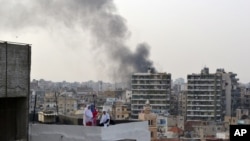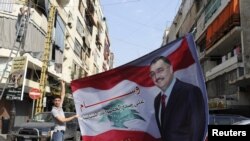CAIRO —
Tensions are high in Lebanon a day after a deadly bombing that killed the country's police intelligence chief and at least seven other people. Militiamen forced businesses to close in the the coastal port city of Tripoli, and army troops shot at protestors blocking roads in the Bekaa Valley.
Lebanese Army tanks deployed along strategic routes in the capital Beirut Saturday, removing burning tires and rubbish which protesters had dumped to block traffic. Army troops also fanned out in the coastal cities of Sidon and Tripoli, as well as across the Bekaa Valley.
Emergency Cabinet meeting
The deployments came after the Lebanese government met in an urgent session at the presidential palace in Baabda to discuss Friday's explosion which killed police Colonel, Wissam al-Hassan who was the senior police intelligence officer in the country.
Lebanese Prime Minister Najib Mikati told journalists that he had informed President Michel Suleiman of his desire to resign, but that Suleiman had urged him to stay on a while longer:
He says that he expressed his desire not to continue in his post during a meeting with the president and the need to form a new government. But, he adds that the president urged him to be a patriot and remain while talks take place, in order to avoid a political vacuum.
Leaders of Lebanon's opposition March 14 coalition had called on the prime minister to resign, insisting that his government bore responsibility for Friday's assassination of Colonel Hassan. Mikati's government is supported by the pro-Syrian Hezbollah group.
Opposition accuses Syria
Opposition leaders Saad Hariri and Walid Jumblatt both accused Syrian President Bashar al-Assad of being behind the bombing which killed Hassan. Christian leader Samir Geagea noted that Friday's explosion was just the latest in a long series to target opposition leaders.
He says that the latest assassination is the 22nd or 23rd in a long string of killings. He notes that he too was targeted for assassination five months ago, along with another opposition leader. He adds that Colonel Hassan was killed for having uncovered a plot by a pro-Syrian politician to kill opposition leaders.
Khattar Abou Diab, who teaches political science at the University of Paris, says that the latest assassination represents a major attempt to destabilize Lebanon.
He says that the killing of Hassan places Lebanon in the eye of the storm, and delivers a major blow to Western interests, since Hassan represents the independent wing of Lebanon's police force, which coordinated with Western nations. He argues that his death was a major victory for Iran and Syria in the region.
Peace envoy for Syria in Damascus
Meanwhile, in Damascus Saturday, United Nations-Arab League Syria envoy Lakhdar Brahimi met with Foreign Minister Walid Muallem. Brahimi told reporters that he was working to arrange a three-day ceasefire and to lessen violence across the country:
He says that he has come to discuss the situation in the country and the need to reduce violence and the possibility of putting in place a three-day halt in the conflict for the Muslim Eid al-Adha holiday.
Over 30,000 Syrians have been killed since the start of a popular uprising against President Bashar al-Assad in March of last year. Thousands of others have also disappeared and are being held in government detention centers across the country.
Lebanese Army tanks deployed along strategic routes in the capital Beirut Saturday, removing burning tires and rubbish which protesters had dumped to block traffic. Army troops also fanned out in the coastal cities of Sidon and Tripoli, as well as across the Bekaa Valley.
Emergency Cabinet meeting
The deployments came after the Lebanese government met in an urgent session at the presidential palace in Baabda to discuss Friday's explosion which killed police Colonel, Wissam al-Hassan who was the senior police intelligence officer in the country.
Lebanese Prime Minister Najib Mikati told journalists that he had informed President Michel Suleiman of his desire to resign, but that Suleiman had urged him to stay on a while longer:
He says that he expressed his desire not to continue in his post during a meeting with the president and the need to form a new government. But, he adds that the president urged him to be a patriot and remain while talks take place, in order to avoid a political vacuum.
Leaders of Lebanon's opposition March 14 coalition had called on the prime minister to resign, insisting that his government bore responsibility for Friday's assassination of Colonel Hassan. Mikati's government is supported by the pro-Syrian Hezbollah group.
Opposition accuses Syria
Opposition leaders Saad Hariri and Walid Jumblatt both accused Syrian President Bashar al-Assad of being behind the bombing which killed Hassan. Christian leader Samir Geagea noted that Friday's explosion was just the latest in a long series to target opposition leaders.
He says that the latest assassination is the 22nd or 23rd in a long string of killings. He notes that he too was targeted for assassination five months ago, along with another opposition leader. He adds that Colonel Hassan was killed for having uncovered a plot by a pro-Syrian politician to kill opposition leaders.
Khattar Abou Diab, who teaches political science at the University of Paris, says that the latest assassination represents a major attempt to destabilize Lebanon.
He says that the killing of Hassan places Lebanon in the eye of the storm, and delivers a major blow to Western interests, since Hassan represents the independent wing of Lebanon's police force, which coordinated with Western nations. He argues that his death was a major victory for Iran and Syria in the region.
Peace envoy for Syria in Damascus
Meanwhile, in Damascus Saturday, United Nations-Arab League Syria envoy Lakhdar Brahimi met with Foreign Minister Walid Muallem. Brahimi told reporters that he was working to arrange a three-day ceasefire and to lessen violence across the country:
He says that he has come to discuss the situation in the country and the need to reduce violence and the possibility of putting in place a three-day halt in the conflict for the Muslim Eid al-Adha holiday.
Over 30,000 Syrians have been killed since the start of a popular uprising against President Bashar al-Assad in March of last year. Thousands of others have also disappeared and are being held in government detention centers across the country.







